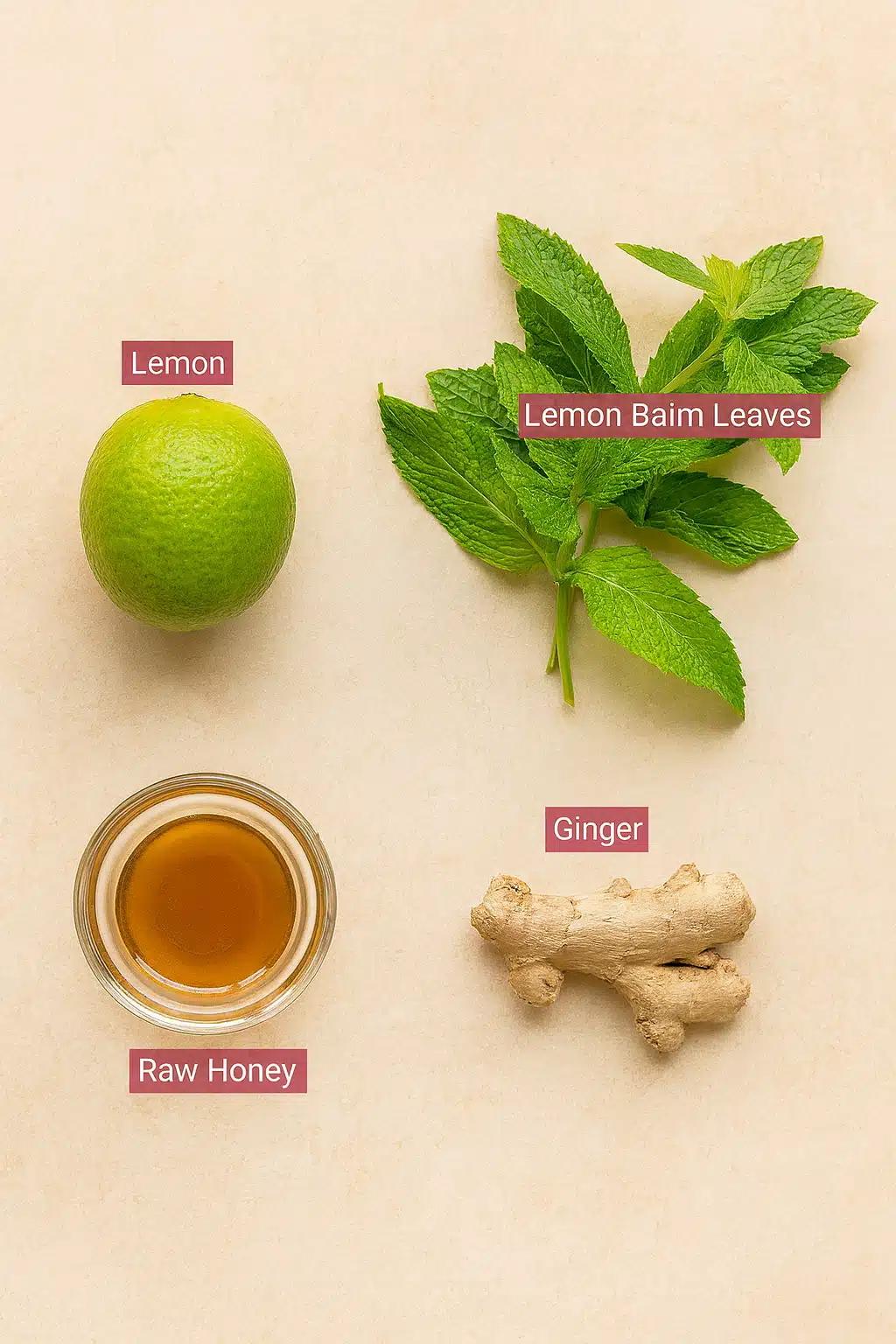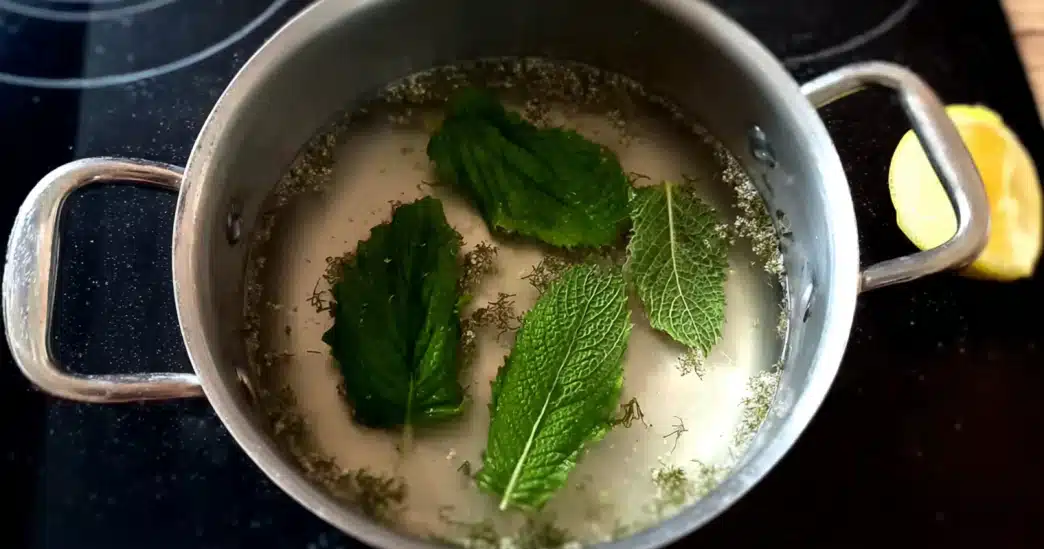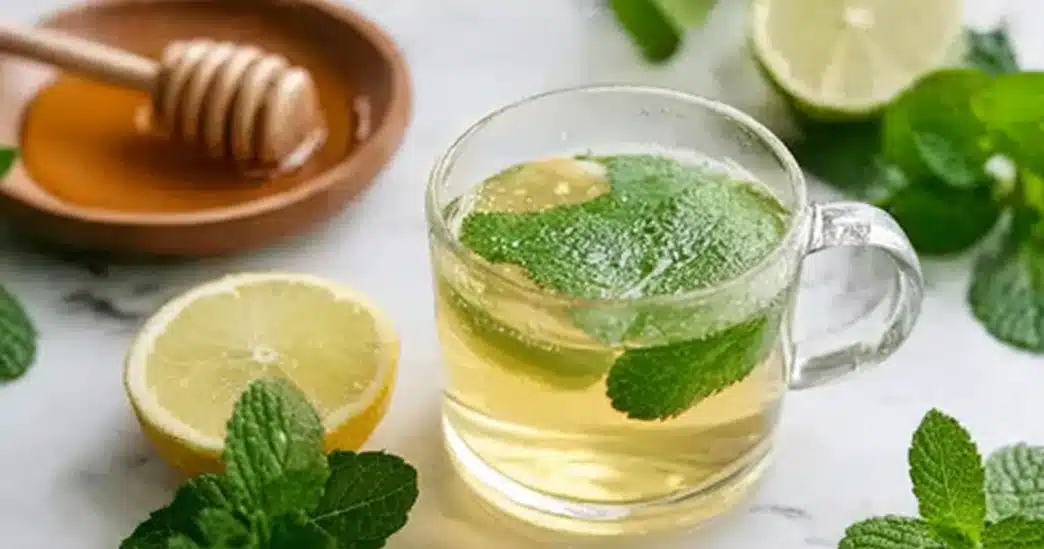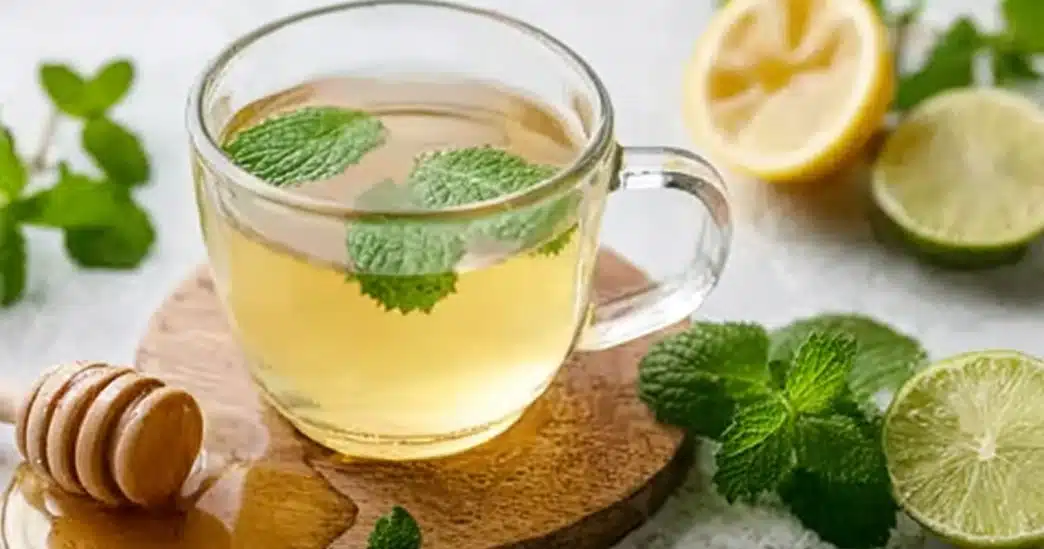Looking for a natural way to support weight management without caffeine or complicated diets? A lemon balm recipe for weight loss could be the refreshing solution you need. Lemon balm, a fragrant herb from the mint family, has long been valued for its calming and digestive properties. When brewed into tea, it becomes a soothing drink that may reduce stress, improve digestion, and gently support your metabolism.
This guide will take you through everything you need to know about lemon balm and its connection to weight loss. You’ll discover what lemon balm is, why it works as part of a wellness routine, the top benefits it offers, and of course, how to prepare a simple lemon balm tea recipe at home. We’ll also cover the best times to enjoy it, smart variations with ginger, and other herbal remedies that can complement your journey. By the end, you’ll know exactly how to use lemon balm tea as a daily ritual for calmness and healthy weight management.
Table of Contents

Lemon Balm Recipe For Weight Loss: A Simple And Effective Detox Drink
- Total Time: 7 minutes
- Yield: 2 servings 1x
- Diet: Vegan
Description
A calming and refreshing lemon balm recipe for weight loss, brewed with fresh lemon balm leaves, ginger, lemon juice, and honey for a soothing metabolism-boosting tea.
Ingredients
1 cup fresh lemon balm leaves (or 1 tbsp dried)
1 tsp freshly grated ginger
Juice of half a lemon
2 cups filtered water
1 tsp raw honey (optional)
Instructions
1. Boil water in a pot or kettle.
2. Add lemon balm leaves and ginger to teapot or infuser.
3. Pour hot water over herbs, cover, and steep 7–10 minutes.
4. Strain into a cup.
5. Add lemon juice and honey if desired.
Notes
Serve warm for relaxation or chilled with cucumber for a flat-belly detox drink.
Use dried lemon balm if fresh leaves aren’t available.
- Prep Time: 5 minutes
- Cook Time: 2 minutes
- Category: Drink, Herbal Tea
- Method: Steeping
- Cuisine: American, Continental
Nutrition
- Serving Size: 1 cup
- Calories: 35
- Sugar: 6g
- Sodium: 5mg
- Fat: 0g
- Saturated Fat: 0g
- Unsaturated Fat: 0g
- Trans Fat: 0g
- Carbohydrates: 9g
- Fiber: 1g
- Protein: 0g
- Cholesterol: 0mg
What is Lemon Balm?
The Origin and History of Lemon Balm
Lemon balm (Melissa officinalis) is a perennial herb that belongs to the mint family. It has a mild lemon scent and has been used for centuries in traditional medicine across Europe and the Mediterranean. Historically, healers recommended lemon balm to ease stress, soothe the stomach, and even promote better sleep. Today, it remains a trusted herb in natural wellness circles, especially in the form of calming teas and extracts.
Nutritional and Medicinal Properties of Lemon Balm
Lemon balm contains essential oils, flavonoids, and compounds like rosmarinic acid that contribute to its therapeutic effects. These compounds have antioxidant and anti-inflammatory properties, which may help the body manage stress and support healthy digestion. As a low-calorie infusion when brewed in water, lemon balm tea becomes an ideal choice for those seeking hydration without added sugars or stimulants.
How Lemon Balm is Traditionally Used in Herbal Medicine
Traditionally, lemon balm has been used to calm the nervous system, ease indigestion, and support restful sleep. Herbalists often prescribe it in teas, tinctures, or topical applications for its soothing qualities. In modern times, researchers have explored how its calming properties may indirectly support weight management by reducing emotional eating and helping regulate appetite hormones. This makes lemon balm not just a relaxation aid, but also a potential ally in natural weight loss routines.
Why Lemon Balm May Support Weight Loss
Stress Reduction and Its Link to Cravings
One of the biggest hidden obstacles to weight loss is stress. Elevated stress levels often trigger cortisol spikes, which increase cravings for high-sugar and high-fat foods. Lemon balm is widely recognized as a calming herb that may help lower stress and support a more balanced mood. By easing tension, it reduces the likelihood of stress-related snacking, making it easier to stay on track with healthy eating. According to WebMD, lemon balm has calming effects that may reduce anxiety and restlessness, which indirectly supports better appetite control.
Sleep Improvement and Appetite Regulation
Sleep is another factor that plays a major role in weight control. Poor sleep disrupts appetite hormones like leptin and ghrelin, making it harder to resist overeating. Lemon balm tea, especially when consumed in the evening, may support restful sleep. When the body is well-rested, appetite regulation improves, cravings diminish, and overall energy levels stabilize, making it easier to maintain an active lifestyle.
Digestive Benefits and Gut Health Support
Digestive comfort is essential for those aiming to lose weight. Lemon balm has been traditionally used to soothe indigestion, reduce bloating, and support gut health. A calm digestive system improves nutrient absorption and makes it easier to avoid the discomfort that can lead to overeating. By helping the digestive process run smoothly, lemon balm tea becomes a gentle, supportive beverage for anyone pursuing weight management goals.
Top Benefits of Lemon Balm for Weight Loss
Improves Digestion and Reduces Bloating
Digestion plays a direct role in how comfortable you feel after meals and how efficiently your body processes food. Lemon balm has natural carminative properties, meaning it can help relieve gas and soothe the stomach. A warm cup of lemon balm tea after meals may ease bloating, reduce discomfort, and encourage smoother digestion. With better digestion, your body absorbs nutrients effectively, which supports balanced energy and helps you avoid unnecessary snacking.
Helps Break the Cycle of Stress Eating
Many people struggle with emotional eating when stress runs high. Lemon balm has a calming effect on the nervous system thanks to compounds such as rosmarinic acid. By naturally lowering stress levels, this herb can reduce the tendency to reach for sugary or salty snacks during tense moments. Less stress means fewer cortisol spikes, which are closely linked to stubborn belly fat and sugar cravings.
Supports Metabolism and Detoxification
While lemon balm is not a fat-burning miracle, it supports the body in subtle ways that may help with weight management. Its antioxidant compounds fight oxidative stress, which can improve metabolic efficiency. Some research also suggests that lemon balm may support healthy blood sugar levels, another important factor for managing weight and avoiding cravings. Combined with proper hydration, lemon balm tea acts as a mild detox drink that supports the liver in flushing out toxins more effectively.
How to Prepare Lemon Balm for Weight Loss (Easy Recipe)
Key Ingredients for Lemon Balm Tea
Making your own lemon balm recipe for weight loss at home is simple and requires only a few fresh, natural ingredients. You can use either fresh or dried lemon balm leaves, but fresh leaves will provide a brighter citrus aroma. Here’s what you’ll need:
- 1 cup fresh lemon balm leaves (or 1 tablespoon dried leaves)
- 1 teaspoon freshly grated ginger (optional but great for metabolism)
- Juice of half a lemon (adds vitamin C and fat-burning support)
- 2 cups filtered water
- 1 teaspoon raw honey (optional for natural sweetness and antioxidants)

Step-by-Step Instructions for Preparation
- Boil the water in a kettle or pot.
- Add the lemon balm leaves and grated ginger into a teapot or infuser.
- Pour the hot water over the herbs, then cover to retain the oils.
- Let the tea steep for 7–10 minutes to extract its full benefits.
- Strain the tea into your favorite mug.
- Stir in lemon juice and honey if you prefer a sweeter, more refreshing taste.
This simple lemon balm recipe for weight loss takes less than 15 minutes to prepare and can be enjoyed either warm or chilled. Drinking it regularly can support digestion, reduce cravings, and give you a soothing, caffeine-free ritual.

Tips for Using Fresh vs Dried Lemon Balm Leaves
- Fresh Leaves: Offer a light, citrusy taste and are ideal when you have access to a garden or farmers market. Use a handful per serving.
- Dried Leaves: More concentrated in flavor. Use 1 tablespoon per cup of hot water. Store in an airtight jar away from sunlight to preserve potency.
- Flavor Boost: Add lemon zest or a cinnamon stick for an extra metabolism-friendly twist.
Best Time to Drink Lemon Balm Tea for Weight Loss
Drinking Lemon Balm Tea in the Morning
Starting your day with a lemon balm recipe for weight loss can gently awaken your system without caffeine. A warm cup in the morning helps kickstart digestion, hydrates your body, and sets a calming tone for the day. Unlike coffee, which can sometimes cause jitters or acid reflux, lemon balm tea offers a light, soothing energy that prepares your body for balanced eating.
Drinking Lemon Balm Tea Before Meals
Enjoying lemon balm tea before lunch or dinner can support digestion and reduce overeating. By calming the stomach, this herbal infusion can help you feel satisfied with smaller portions. Drinking this tea about 20 minutes before meals may also reduce bloating and help your body absorb nutrients more efficiently. For those aiming to curb appetite and practice mindful eating, this timing works particularly well.
Drinking Lemon Balm Tea in the Evening
Perhaps the most popular time to enjoy a lemon balm recipe for weight loss is at night. Stress and late-night cravings can easily sabotage healthy routines, but lemon balm tea offers a relaxing way to wind down. By promoting restful sleep, it also helps regulate appetite hormones like leptin and ghrelin, which play a major role in controlling hunger. A bedtime cup of lemon balm tea is not just soothing but also a smart step toward balanced weight management.
Lemon Balm Recipe with Ginger, The Ultimate Herbal Weight Loss Remedy
Why Ginger Enhances Lemon Balm Tea
Ginger is a powerful root known for its thermogenic effects, which means it slightly increases your body’s fat-burning potential. When combined with lemon balm, it creates a synergy that boosts metabolism, reduces inflammation, and aids digestion. Adding ginger to a lemon balm recipe for weight loss enhances not only the flavor but also the health benefits.
Recipe Variations for Extra Benefits
You can adjust your lemon balm and ginger tea based on your wellness goals. Here are some variations to try:
- Metabolism Booster: Add a green tea bag for a gentle caffeine lift that supports fat burning.
- Flat-Tummy Water: Brew lemon balm tea, chill it overnight, and infuse it with cucumber ribbons for a refreshing detox drink.
- Spice Twist: Add a cinnamon stick while steeping to balance blood sugar and curb cravings.
- Citrus Kick: Add lemon zest for extra vitamin C and a brighter taste.
Pro Tips for Brewing a Perfect Cup
- Steep for 7–10 minutes to allow both lemon balm and ginger to release their full benefits.
- For stronger effects, gently crush the lemon balm leaves before steeping.
- Drink the tea without added sugar to keep it calorie-free and effective for weight management.
- For iced tea, brew a larger batch and refrigerate it for up to 48 hours.
By pairing ginger with a lemon balm recipe for weight loss, you create a powerful herbal infusion that supports metabolism, digestion, and relaxation all at once.

Other Natural Herbal Drinks to Aid Weight Loss
Mint Tea for Digestion and Freshness
Mint is another herb from the same family as lemon balm, and it’s well-known for aiding digestion. A cup of mint tea after meals can reduce bloating, soothe the stomach, and leave you feeling refreshed. For those who enjoy variety, alternating mint tea with a lemon balm recipe for weight loss keeps your wellness routine interesting while offering similar digestive benefits.
Dandelion Tea for Detox and Liver Health
Dandelion tea has a long history of use as a natural diuretic and detoxifier. It supports the liver, helps the body flush out toxins, and may reduce water retention. This makes it a great companion to lemon balm tea in a holistic weight management plan. Adding dandelion tea to your weekly rotation gives you another caffeine-free herbal option with unique benefits.
Green Tea and Cinnamon Blends for Metabolism
Green tea is one of the most researched beverages for weight management because of its catechin and caffeine content. When combined with cinnamon, it offers additional blood-sugar balancing properties. While green tea contains caffeine, pairing it with calming herbs like lemon balm can create a balanced drink that boosts metabolism while keeping stress in check. This makes it a versatile choice alongside your daily lemon balm recipe for weight loss.
Conclusion – Sip Your Way to a Healthier, Calmer You
Why Lemon Balm Tea Deserves a Spot in Your Routine
If you are looking for a simple way to support digestion, manage cravings, and create a calming evening ritual, then a lemon balm recipe for weight loss is worth adding to your wellness routine. It combines stress relief, improved sleep, and gentle metabolism support in one soothing drink.
Final Thoughts on Natural Weight Loss Remedies
Unlike quick-fix diets or harsh supplements, a lemon balm recipe for weight loss focuses on balance and consistency. It’s not about overnight results but about forming daily habits that naturally support your body. Pairing this tea with healthy meals, regular movement, and good sleep habits can help you stay on track.
Encouragement for a Balanced Wellness Lifestyle
At its core, this lemon balm recipe for weight loss is more than just a beverage. It’s a reminder to slow down, take care of yourself, and trust in small, sustainable choices. Whether you enjoy it in the morning, before meals, or as a relaxing bedtime drink, this herbal tea can play a meaningful role in your weight management journey.
FAQs About lemon balm recipe for weight loss
How to consume lemon balm for weight loss?
The easiest way to consume lemon balm for weight loss is by preparing it as a herbal tea. You can brew fresh or dried lemon balm leaves in hot water, optionally adding ginger, lemon juice, or honey. Drink it once or twice daily, either warm or iced. Some people also use lemon balm extract or capsules, but tea offers hydration and a calming ritual, making it the most effective option for daily use.
What is the strongest herb for weight loss?
While no herb can replace balanced eating and exercise, green tea is often considered the strongest herb for weight loss due to its high antioxidant and catechin content. Other effective herbs include ginger, cinnamon, and dandelion. Lemon balm is unique because it works indirectly by reducing stress and improving digestion, which helps prevent overeating and emotional cravings.
How do you make lemon balm for a flat stomach?
To prepare lemon balm for a flat stomach, brew a tea using fresh lemon balm leaves, hot water, and a small amount of ginger or lemon juice. This combination supports digestion, reduces bloating, and may help control appetite. Drinking this lemon balm recipe for weight loss before meals or in the evening can be especially beneficial for reducing discomfort and promoting a flatter stomach over time.
Can lemon balm really help with weight loss?
Lemon balm will not burn fat directly, but it supports weight loss through multiple indirect benefits. It reduces stress-related cravings, improves digestion, enhances sleep, and encourages mindful eating habits. These combined effects make it a valuable herb to include in your natural weight loss routine.
Can I use dried lemon balm instead of fresh?
Yes, dried lemon balm is just as effective as fresh leaves. Use one tablespoon of dried lemon balm for each cup of hot water. The flavor may be slightly stronger, so you can adjust the amount to your taste. Properly stored dried lemon balm can last for several months, making it convenient for year-round use.
How often should I drink lemon balm tea?
For the best results, drink lemon balm tea one to three times a day. Many people enjoy a cup in the morning for digestion, before meals to curb appetite, and in the evening to promote restful sleep. Consistency is important, as regular use helps your body fully benefit from this calming, metabolism-supportive herb.











